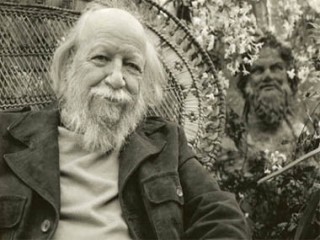
William Golding biography
Date of birth : 1911-09-19
Date of death : 1993-06-19
Birthplace : Saint Columb, Cornwall, England
Nationality : British
Category : Famous Figures
Last modified : 2010-09-30
Credited as : Author, primary novel "Lord of The Flies", the Nobel Prize for Literature
2 votes so far
Golding's Childhood and college years
Golding was born in Saint Columb Minor in Cornwall, England, in 1911. His father, Alex, was a schoolmaster, while his mother, Mildred, was active in the Women's Suffrage Movement (the movement for women's right to vote). As a boy, his favorite authors included H. G. Wells (1866–1946), Jules Verne (1828–1905), and Edgar Rice Burroughs (1875–1950). Since the age of seven, Golding had been writing stories, and at the age of twelve he attempted to write a novel.
Golding remained an enthusiastic writer and, upon entering Brasenose College of Oxford University, abandoned his plans to study science, preferring to read English literature. At twenty-two, a year before taking his degree in English, Golding saw his first literary work published—a poetry collection simply titled Poems.
After graduating from Oxford in 1935, Golding continued the family tradition by becoming a schoolmaster in Salisbury, Wiltshire. His teaching career was interrupted in 1940, however, with the outbreak of World War II (1939–45). Lieutenant Golding served five years in the British Royal Navy and saw active duty in the North Atlantic, commanding a rocket launching craft.
Lord of the Flies
Golding had enhanced his knowledge of Greek history and mythology by reading while at sea, and when he returned to his post at Bishop Wordsworth's School in 1945, he began furthering his writing career. He wrote three novels, all of which went unpublished. But his frustration would not last long, when, in 1954, Golding created The Lord of the Flies. The novel was rejected by twenty-one publishers before Faber & Faber accepted the forty-three-year-old schoolmaster's book.
Initially, the tale of a group of schoolboys stranded on an island during their escape from war received mixed reviews and sold only modestly in its hardcover edition. But when the paperback edition was published in 1959, thus making the book more accessible to students, the novel began to sell briskly. Teachers, aware of the student interest and impressed by the strong theme and symbolism of the work, began assigning Lord of the Flies to their literature classes. As the novel's reputation grew, critics reacted by drawing scholarly reviews out of what was previously dismissed as just another adventure story.
The author's extremely productive output—five novels in ten years—and the high quality of his work established him as one of the late twentieth-century's most distinguished writers. This view of Golding was cemented in 1965, when the author was named a Commander of the British Empire.
Later works
After the success of Lord of the Flies, Golding enjoyed success with other novels, including Pincher Martin (1957), Free Fall (1959) and The Pyramid (1967). The author's creative output then dropped drastically. He produced no novels and only a handful of novellas (short novels), short stories, and other occasional pieces.
In 1979 Golding returned with the publi cation of Darkness Visible which received mixed reviews. The author faced his harshest criticism to date with the publication of his 1984 novel The Paper Men, a drama about an aging, suc cessful novelist's conflicts with his pushy, over-bearing biographer. Departing briefly from fic tion, Golding wrote a book containing essays, reviews, and lectures. A Moving Target appeared in 1982, one year prior to the author's receipt of the Nobel Prize in Literature.
William Golding died in England in 1993. A year after his death, The Double Tongue was released, published from a manu script Golding completed before he died.
















